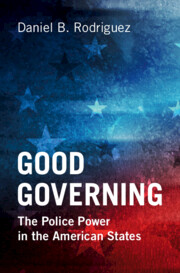The reward for reaching the end of a long book should be a short conclusion, and so the concluding words here are brief.
The police power in the American states was designed to become, and has indeed become, the fulcrum of regulatory choice in our republic. It is a power inherent in state constitutionalism, sometimes made explicit in the documents and other times merely assumed as a central feature of what it means for government to have authority to act on behalf of its sovereign people and to the betterment of the people’s welfare.
There has been no practical reason to define it in clear and coherent ways, and despite scholars’ and judges’ efforts over more than two centuries, a one- or two-sentence definition remains elusive. Nonetheless, the contours of the power, its scope and its purpose, can be and have been shaped by many years of judicial interpretation and also close scrutiny by commentators. In older times, there were efforts to get at the beating heart of the police power in a holistic way; and so many cases from the states and, more rarely, from the Supreme Court aspired to give meaning to this general power. In more contemporary times, it would seem that this quest has been largely abandoned. The police power is defined most commonly in consideration of a particular dispute, the question always being: “How far can the government go in regulating X or Y?” Usually this has been accompanied by a consideration of a constitutional right that is put up against the police measure in order to determine whether the government has transgressed on an individual’s right under either the national or the state constitution. But the quest is ultimately the same: To articulate the powers of government to protect our health, safety, morals, and welfare – its essence and its purpose – and to likewise figure out when this power has gone too far and must be reigned in by our understandings of what the constitution requires.
Given all that we know about the American legal system, we should be surprised that these questions will ultimately be answered, for better or worse, by courts in adjudication. And so the place to look for a comprehensive understanding of the scope of the police power will be the large body of cases in which the police power has been implicated. The value added of a deep analysis of the police power as here in this book, is that one can look at these legal decisions alongside a broader account of the power, focusing on why it is such an instrumental part of our scheme of American constitutionalism, how it evolved, what structural considerations go into its use and appropriate limits, and, finally, how it can be used by responsible governments to address some of our super-wicked problems.
The use of the phrase “good governing” to describe the overall aim and objectives of the police power is intended to have two separate meanings: First, it refers to the common good that the power is meant to facilitate, this as part of our overarching, albeit dynamic, constitutional objectives; and, second, it refers to the ambition that we have a government that works, that does its best to truly protect us from threats to our health and safety, the preservation of community morals that we can agree upon as twenty-first-century Americans committed to equality and inclusion (among other commitments, to be sure), and to the general welfare. We should expect our leaders to govern well and for the common good.

